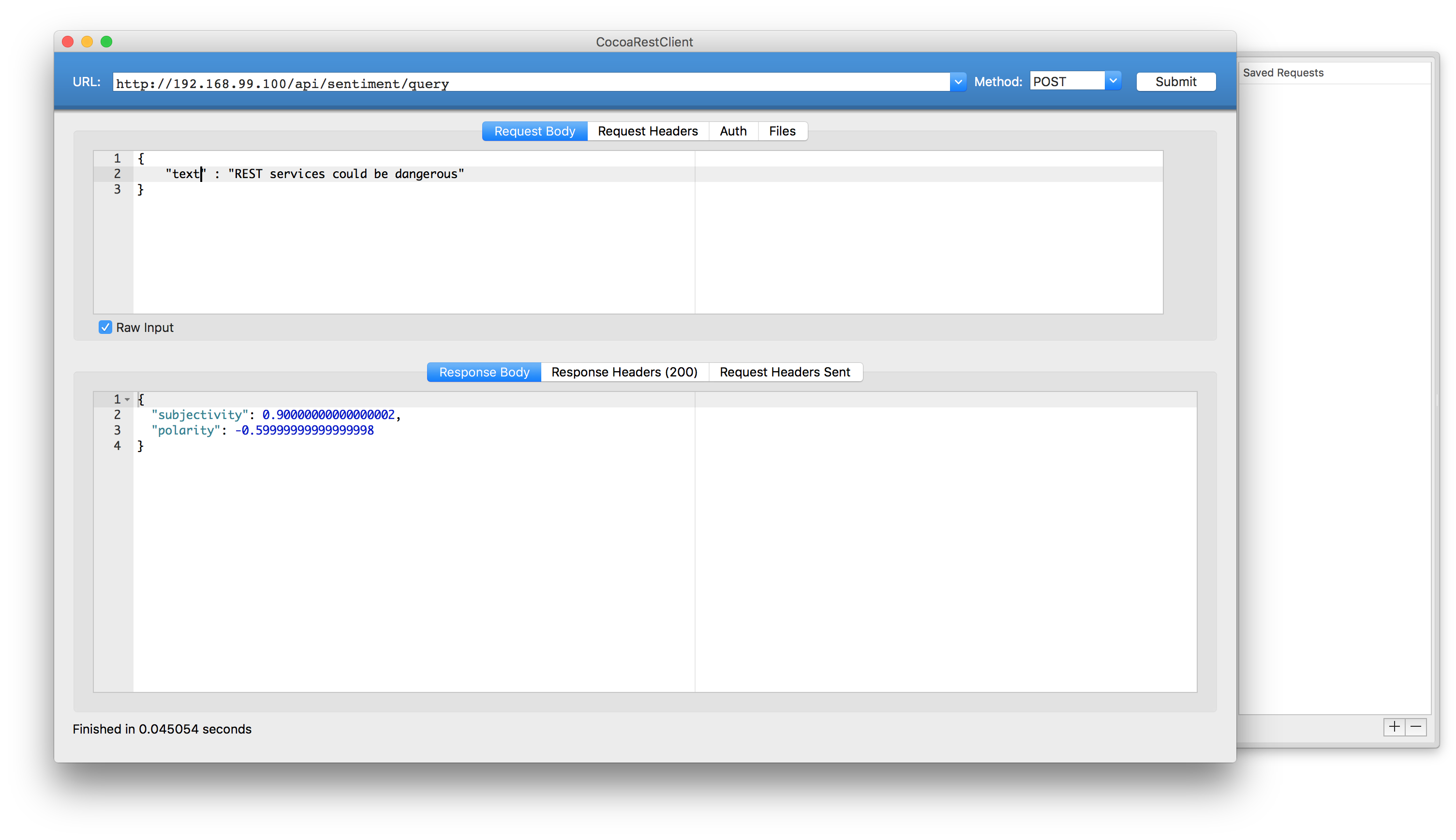I’ve been trying to learn how to create and use docker and I thought that could be a nice idea to create a machine learning docker as a starting example to have something running.
But instead to use a existing docker image for machine learning I’ve try to create from scratch a full functional image that provide REST API machine learning services.
But in any case the full sourced of this is available in this git:
https://github.com/cecile/docker-ml-api
or download from Docker hub:
$ docker pull jamedina/ml-apiBefore starting its worth mentioning that going through getting started with docker is a excellent starting point for understanding many of the docker topics and will give you the tools required.
First lets create a new folder for our docker image an the Dockerfile:
$ mkdir ml-api
$ cd ml-api
$ touch DockerfileNow we add the initial lines to our docker file:
FROM ubuntu:14.04
MAINTAINER Juan Medina <jamedina@gmail.com>
ENV DEBIAN_FRONTEND noninteractiveLets build our docker, initial build will take a while:
$ docker build -t ml-api .And them run the docker in iterative way since there is nothing there yet.
$ docker run -i ml-apiIn the iterative shell we could just try to list files and exit:
$ ls
$ exitLets add now python and pip to the docker image adding to the Dockerfile:
RUN apt-get update
RUN apt-get -y install python-pip python-dev
CMD ["/usr/bin/python","--version"]Now we could just rebuild and run:
$ docker build -t ml-api .
$ docker run ml-apiSomething like this will be output:
Python 2.7.6Now lets create a folder for our python app:
$ mkdir python-appLets create a small test python program in /python-app/test.py:
if __name__ == '__main__':
print("hello from a python docker")Modify the Dockerfile to call our python program:
FROM ubuntu:14.04
MAINTAINER Juan Medina <jamedina@gmail.com>
ENV DEBIAN_FRONTEND noninteractive
RUN apt-get update
RUN apt-get -y install python-pip python-dev
copy python-app /var/python-app
CMD ["/usr/bin/python","/var/python-app/test.py"]Rebuild and run the docker will produce:
hello from a python dockerSometimes we like to clean our docker system, if we do this we could see the containers:
$ docker ps -aTo stop and remove our containers we could do:
$ docker stop `docker ps -qa`
$ docker rm `docker ps -qa`Now we are going to change our python installation to be a machine learning installation, edit the Dockerfile and change the apt-install to be:
RUN apt-get -y install python-pip python-numpy python-scipy python-matplotlib ipython ipython-notebook python-pandas python-sympy python-nose python-sklearn python-nltkNow we could modify our test program /python-app/test.py:
from nltk import word_tokenize
if __name__ == '__main__':
s = "hello from a python docker, now with tokens using nltk"
t = word_tokenize(s)
print(t)And this will be the output:
['hello', 'from', 'a', 'python', 'docker', ',', 'now', 'with', 'tokens', 'using', 'nltk']Is time to do a simple sentiment analysis using TextBlob Now we are going to create a folder for our configuration:
$ mkdir cfgWe will add this file for set python dependencies in /cfg/python-deps.txt
textblobWe are going to modify the Dockerfile to copy the config, and invoke pip to install dependencies, them we will download the corpus data for TextBlob:
FROM ubuntu:14.04
MAINTAINER Juan Medina <jamedina@gmail.com>
ENV DEBIAN_FRONTEND noninteractive
RUN apt-get update
RUN apt-get -y install python-pip python-numpy python-scipy python-matplotlib ipython ipython-notebook python-pandas python-sympy python-nose python-sklearn python-nltk
copy python-app /var/python-app
copy cfg /etc/cfg
RUN pip install -r /etc/cfg/python-deps.txt
RUN python -m textblob.download_corpora
CMD ["/usr/bin/python","/var/python-app/test.py"]So lets add some sentiment analysis to our test program:
from textblob import TextBlob
if __name__ == '__main__':
s = "Python is great"
b = TextBlob(s)
print(b.sentiment)This will be the output:
Sentiment(polarity=0.8, subjectivity=0.75)Now lets configure the flask web app.
First add to /cfg/python-deps.txt:
flaskModify Dockerfile to export a port and set and environment variable:
FROM ubuntu:14.04
MAINTAINER Juan Medina <jamedina@gmail.com>
ENV DEBIAN_FRONTEND noninteractive
RUN apt-get update
RUN apt-get -y install python-pip python-numpy python-scipy python-matplotlib ipython ipython-notebook python-pandas python-sympy python-nose python-sklearn python-nltk
copy python-app /var/python-app
copy cfg /etc/cfg
RUN pip install -r /etc/cfg/python-deps.txt
RUN python -m textblob.download_corpora
ENV FLASK_PORT 8080
EXPOSE $FLASK_PORT
CMD ["/usr/bin/python","/var/python-app/flask-web.py"]And finally lets sketch a simple test service in python-app/flask-web.py:
import os
from flask import Flask
from flask import jsonify
app = Flask(__name__)
@app.route('/api/test')
def test():
return jsonify(result = "ok")
if __name__ == '__main__':
port = os.environ['FLASK_PORT']
;app.run(host='0.0.0.0',port=int(port))Now to run our docker in daemon and map the expose port to port 80:
$ docker run -d -p 80:8080 ml-apiRemember that the docker could be stop with:
$ docker stop [container]</code>We need to know the IP of our container, if we are using docker machine and we haven’t change the default VM we could use:
$ docker-machine ip defaultThem we could test using the url : http://IP/api/test
We should see this:
{
"result": "ok"
}And we could see the log using :
$ docker logs [container]This should output
* Running on http://0.0.0.0:8080/ (Press CTRL+C to quit)
192.168.99.1 - - [05/Dec/2015 12:05:11] "GET /api/test HTTP/1.1" 200 -Now lets create a basic REST service that return the sentiment from an string, we will add some basic error handling to our flask service, just edit /python-app/flask-web.py:
import sys
import os
import logging
from flask import Flask
from flask import jsonify
from flask import request
from textblob import TextBlob
app = Flask(__name__)
@app.route('/api/sentiment/query',methods=['POST','GET'])
def query_sentiment():
try:
req_json = request.get_json()
if req_json is None:
return jsonify( error = 'this service require A JSON request' )
else:
if not ('text' in req_json):
raise Exception('Missing mandatory paramater "text"')
text = req_json['text']
blob = TextBlob(text)
sentiment = blob.sentiment
return jsonify(polarity = sentiment.polarity, subjectivity = sentiment.subjectivity)
except Exception as ex:
app.log.error(type(ex))
app.log.error(ex.args)
app.log.error(ex)
return jsonify(error = str(ex))
if __name__ == '__main__':
LOG_FORMAT = "'%(asctime)s - %(name)s - %(levelname)s - %(message)s'"
logging.basicConfig(level=logging.DEBUG,format=LOG_FORMAT)
app.log = logging.getLogger(__name__)
port = os.environ['FLASK_PORT']
app.run(host='0.0.0.0',port=int(port),debug=False)</code>Them we could test our service:
